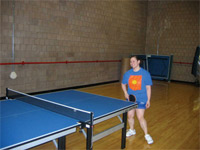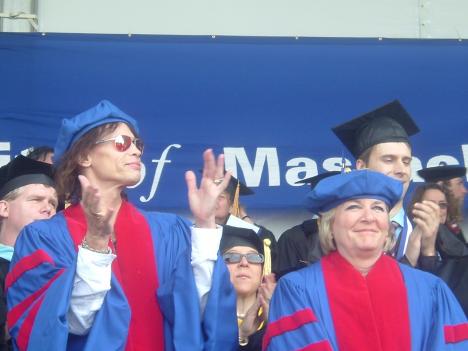Pin-Pong Club in Texas

UMB senior Eileen Lintz competed in the National Collegiate Championships in Fort Worth, Texas.
April 15, 2005
BY SHUN HASEGAWAStaff Writer
In the fall of 2003, a crowd formed by the toddling UMB Pin-Pong Club had surrounded a “rickety, broken-down, piece of junk” table at Clark Athletic Center where Eileen Lintz and her teammates, as many as twenty, were longing, if even for only a few swings, their table-tennis bouts on Friday afternoons.
Two calendar cycles later, on the past weekend of April 1 and 2, Lintz, captain/co-founder of the club, was still waiting for her turn to play before shoals of people.
This time, however, a size of the crowd was bigger, and the temperature was higher at Fort Worth, Texas, where she competed in women’s singles of the Collegiate National Tournament at Texas Wesleyan University.
“More than anything, it was wonderful to be able to participate in a national competition,” said Lintz. “It was very well organized. You are escorted to a table. You have a referee for every match. They call your name and announce who you represent. And there were spectators. It’s honorable that I played [in the tournament]… I was also happy to represent UMass.”
Lintz was 2-2 and finished third among five players in Group 2 of the Preliminary Rounds, barely failing to clinch a berth into the Championship Bracket by one match. The senior defeated Hua Dan of Virginia Polytechnic University and Vega Shah of University of South California straight, while she lost to Biba Golic of the Illinois Institute of Technology, 3-0, and to Sabrina Worrell of the hosting Texas Wesleyan University (TWU) by 3-1. Lintz was put in the Consolation Bracket held on the day after where she was victorious once more and lost the next match.
“I’m proud of my performance.” Lintz commented, considering one of the two who defeated her was talented enough to intend to be professional, while the other was granted table-tennis sponsorship of TWU. “I think that coming third in a competition like that is very good.”
A number-one ranked female player in New England, Lintz has a 7-6 record in singles and 5-2 as doubles in the 2004-05 season, facing male counterparts the majority of the time.
The feat is not limited at an individual level. Since having appeared in the first official competition on October 16, 2004, UMB has grabbed an unshakable recognition as a team in the New England Division of the National Collegiate Table Tennis Association (NCTTA). The Beacons are 8-5 for the season and stand fourth out of nine teams in the division, closely chasing rivals with longer history and better funding, such as BU, Northeastern and Harvard.
Lintz herself is amazed how rapidly the club has improved on performance and membership within a couple of years since the days when she passed flyers and talked to people on campus where she successfully found fellows who were “very enthusiastic and serious about playing table tennis.” According to Lintz, the team now enjoys from ten to twenty people appearing to train each week.
Her next concern was, just like for any other student organization, a financial one. To gather essential equipment, such as tournament-level tables, rackets, and balls, were obviously more expensive than the several hundreds of dollars a semester procured from Student Life, which also couldn’t find a place for the club to practice.
A turning point came of when Lintz visited Charlie Titus, then-Director of Athletics, who found them to be “working hard and clearly committed to developing into a strong club,” bought four tournament-quality tables (approximately $4000), and arranged the Creative Room at Clark Athletic Center for the team to practice on Fridays at 2:30 p.m. “As a whole, I appreciate the support of the Athletic Department,” Lintz said. Qiumars Hedayatian, her personal coach, donated another table.
However, the question of how to fund the club for the long-term lingers. The Athletic Department, which played a major role in development of the club, has no obligation to further support them, since the National Collegiate Athletic Association (NCAA) doesn’t allow the globally popular game in its 22-sport structure, while the organization grants permission to fencing, competitive target-shooting, and water polo.
The exclusion cost Lintz 400-plus dollars during the three-day trip to Texas for transportation and accommodation, despite her endeavor to save some amount of money by bringing food on her own. For the team, she couldn’t afford to keep hiring Hedayatian as a coach, who costs around $1,200 per semester.
Asked about what the club hopes be supplied with by the department and the university, Lintz pointed out using the Creative Room to practice more than once a week as well as buying rackets and hundreds of balls, while she regrets she could have done much better in fundraising.
Titus, present Vice Chancellor for Student Affairs, answered that the club has never had a privilege “The University has supported the ping-pong club as well as other clubs. This will continue to happen at levels that are appropriate,” he commented.
After her upcoming graduation this semester, Lintz will move to Munich, Germany, for the first time in seven years, to pursue a master’s degree in chemistry. It will be a reunion with a country where her beloved sport is much more popular than in the United States. “I’ve contacted some clubs over there, and some of them are interested in me as a player, which is really good.”
“I am really happy to see that [we have] done well. People have been responsive and positive about table tennis. I think it is richness of my UMass experience,” she said.





















































